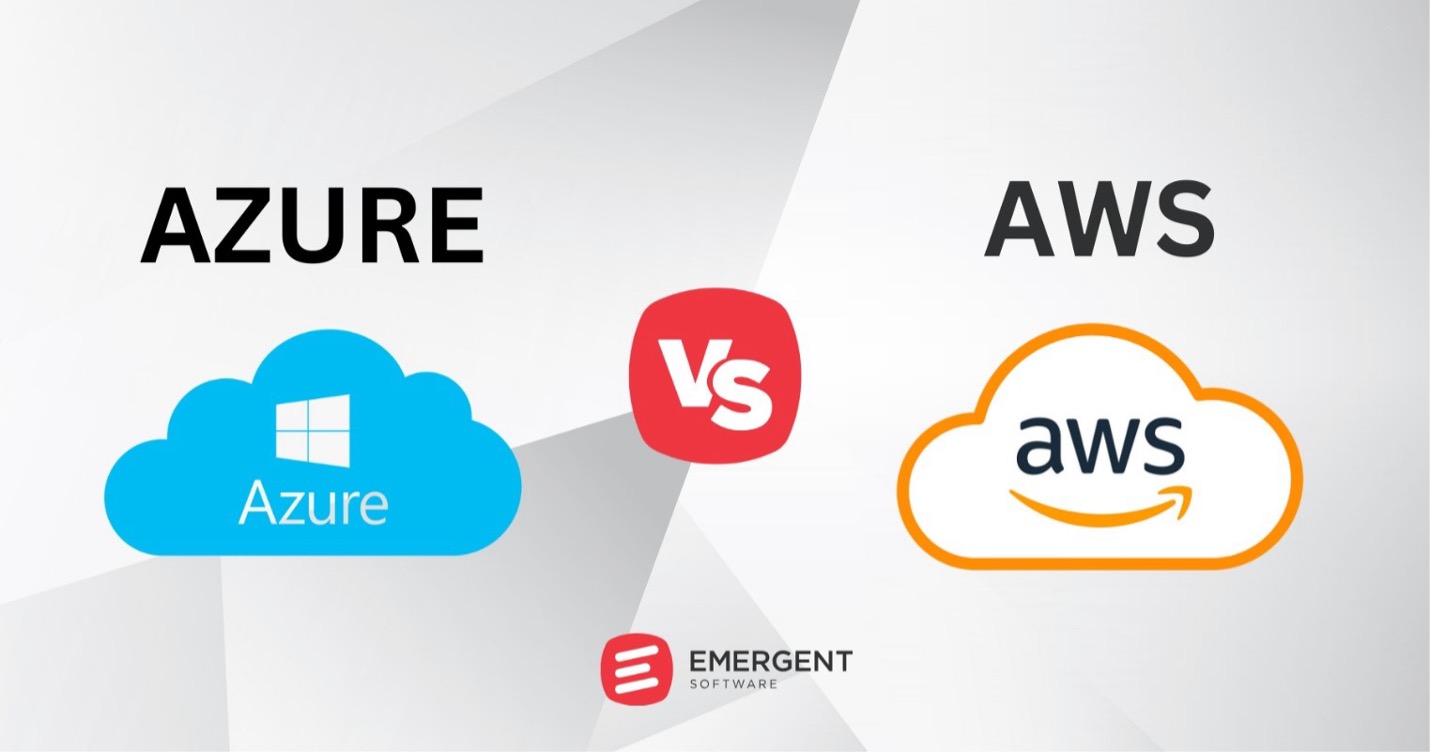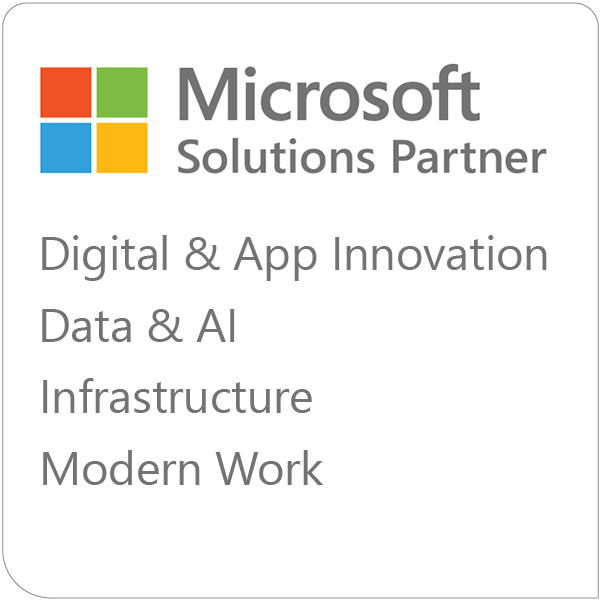In This Blog:
- Comparing Cloud Giants
- Computation Power
- Storage
- Database
- Content Delivery and Networking
- Machine Learning
- Ecosystem
- Price Comparison
- Cloud Adoption
- Recommendation
- Conclusion
- Frequently Asked Questions
Comparing Cloud Giants
Azure and AWS are two of the market’s leading cloud service providers. If you’re a decision-maker for your organization’s cloud solutions, chances are you’ve considered the differences between these two main players. Alternatively, maybe you’re currently in the process of choosing a cloud provider. If that’s the case, Emergent Software is here to help!
While both Azure and AWS offer robust ecosystems, Azure stands out with its deep integration with Microsoft's widely-used enterprise software and development tools. This makes Azure the natural fit for companies already leveraging Microsoft technologies. Azure has also shown impressive growth in cloud adoption, with many enterprises choosing it as their trusted cloud platform.
For a quick, high-level comparison of the two, check out this table:
| FEATURE | Azure | AWS |
|---|---|---|
|
Computation Power |
Virtual Machines (VMs) | Elastic Compute Cloud (EC2) |
|
Storage |
Azure Blob Storage |
Simple Storage Service (S3) |
| Database | Azure SQL Database | Amazon RDS |
|
Managed Data Warehouse |
SQL Warehouse | Redshift |
|
Kubernetes Management |
Kubernetes Services | EKS |
|
Object Storage |
Block Blob | S3 |
|
File Storage |
Azure Files | EFS |
|
Content Delivery & Networking |
Azure Virtual Network (VNet) | Amazon VPC |
|
Machine Learning |
Azure Machine Learning Studio | Amazon SageMaker |
|
Global Content Delivery |
Delivery Network | CloudFront |
|
Frontend Hosting |
Azure Blob Storage | Amazon S3 |
|
Backend Hosting |
Azure Virtual Machines | Amazon EC2 |
|
Database |
Azure Database for PostgreSQL | Amazon RDS |
|
Load Balancing |
Azure Load Balancer | Application Load Balancer |
|
Container Service |
Azure Container Instances | Amazon ECS |
|
DevOps - CI/CD |
Azure Pipelines | AWS CodePipeline |
|
Monitoring |
Azure Monitor | Amazon CloudWatch |
This article provides a high-level comparison between these cloud giants, focusing on their ecosystems, cloud adoption patterns, and recommendations for choosing between them. By the end, we'll equip you with all the considerations you should keep in mind when choosing the better option for businesses seeking a reliable, feature-rich, and future-ready cloud solution.
Read also: Comparing the Major Cloud Platforms: AWS vs Azure vs Google Cloud
Computation Power
One of the more important factors to consider when reviewing Cloud Providers is Computation Power. It dictates how well a device can perform tasks, process data, and manage workloads across the cloud. Efficient, scalable computation power is essential for running applications smoothly and meeting dynamic workload demands.
| Azure | AWS |
|---|---|
|
Virtual Machines (VMs) offer scalable compute resources |
Elastic Compute Cloud (EC2) provides resizable compute capacity |
Storage
Storage solutions in your cloud environments need to be secure, scalable, and flexible to manage robust data.
| Azure | AWS |
|---|---|
|
Azure Blob Storage for unstructured data |
Simple Storage Service (S3) for object storage |
Database
Databases are the backbone of many applications, which makes selecting a provider with a strong, scalable, and reliable database service crucial.
| Azure | AWS |
|---|---|
|
Azure SQL Database for managed relational databases |
Amazon Relational Database Service (RDS) for managed databases |
Content Delivery and Networking Connectivity
Content delivery and network connectivity ensure that workloads and applications are accessible with minimal latency and optimal security.
| Azure | AWS |
|---|---|
|
Azure Virtual Network (VNet) for private cloud environment |
Amazon Virtual Private Cloud (VPC) for isolated cloud resources |
Machine Learning
Machine learning capabilities are increasingly valuable for organizations aiming to leverage data for predictive insights, automation, and innovation.
| Azure | AWS |
|---|---|
|
Azure Machine Learning Studio for creating ML models |
Amazon SageMaker for building and deploying ML models |
Ecosystem
Azure
Microsoft Azure excels in its tight integration with the Microsoft product ecosystem. If your organization relies on Microsoft products such as Windows Server, SQL Server, Office 365, Active Directory, or Dynamics 365, Azure provides a seamless and unified platform. The deep integration between Azure and Microsoft's offerings makes it an attractive option for companies that prioritize a cohesive and interconnected environment. Additionally, Azure's strength lies in its hybrid cloud solutions, allowing organizations to bridge the gap between on-premises infrastructure and the cloud.
AWS
Amazon Web Services (AWS) follows a modular approach when it comes to its services. This design philosophy allows users to select and integrate services and may be helpful if you require a wide range of customizable services. The flexibility and extensibility of AWS make it a popular choice for organizations looking for a highly adaptable cloud platform.
AWS vs Azure Price Comparison - Full Stack App
Cloud pricing models can significantly impact long-term budgets, making it essential to select a provider with transparent and manageable costs. Both Azure and AWS use a pay-as-you-go model based on resource usage. Here’s a more in-depth look at what that might look like:
| Component | Azure | AWS |
|---|---|---|
|
Frontend Hosting |
Azure Blob Storage $0.0184 per GiB storage, $0.004 per 10,000 read operations |
Amazon S3 $0.023 per GiB storage, $0.0004 per 10,000 GET requests |
|
Backend Hosting |
Azure Virtual Machines A1 v2 instance (1 vCPU, 2GiB RAM): $0.018 per hour |
Amazon EC2 t2.small instance (1 vCPU, 2GiB RAM): $0.023 per hour |
| Database |
Azure Database for PostgreSQL B1ms (1 vCore, 2 GiB RAM): $0.017 per hour |
db.t3.small instance (2 vCPU, 2GiB RAM): $0.034 per hour |
|
Load Balancing |
Azure Load Balancer $0.005 per GiB processed |
Application Load Balancer $0.0225 per Application Load Balancer-hour, $0.008 per LCU-hour |
|
Container Service |
Azure Container Instances $0.0000099 per GiB per second |
Amazon ECS $0.00000925 per GiB per hour |
|
DevOps - CI/CD |
Azure Pipelines Free for 1,800 minutes per month, $0.016 per minute after free tier |
AWS CodePipeline $1.00 per active pipeline per month |
|
Monitoring |
Azure Monitor $0.10 per GiB ingested, first 5 GiB free per month |
Amazon CloudWatch
$0.30 per metric per month, first 10 metrics free |
These prices are based on on-demand, pay-as-you-go pricing in the US East (N. Virginia) region for AWS and East US region for Azure. For more information, please see Azure pricing calculator and AWS pricing calculator. Actual prices may vary based on usage, region, and pricing changes. Both AWS and Azure offer reserved instances and other discounts for long-term commitments or high-volume usage which can significantly reduce costs.
Cloud Adoption
Companies using Azure often focus on utilizing the cloud as a landing zone for migrating their existing on-premises data centers. They may not fully embrace cloud-native technologies and instead opt for a hybrid approach. Azure's "hybrid benefit" allows customers to use their existing on-premises licenses to obtain significant discounts on Azure's IaaS (Infrastructure as a Service) and PaaS SQL Server offerings, making it an attractive option for organizations with substantial investments in Microsoft technologies.
When it comes to cloud adoption patterns, companies using AWS tend to be more proactive in fully embracing PaaS (Platform as a Service) and serverless cloud solutions. They are more likely to leverage the advanced capabilities of the cloud and adopt cloud-native architectures.
Recommendation
When deciding between AWS and Azure, it is crucial to consider your organization's preferred tools and services. For enterprises with significant existing investments in Microsoft technologies, Azure is often the clear choice. Its tight integration with the Microsoft ecosystem allows organizations to leverage their existing skills and infrastructure.
Azure has established itself as a leader in serving enterprise customers, with a proven track record of handling mission-critical workloads across diverse industries. Its comprehensive suite of services and commitment to enterprise needs make it a top pick for many organizations.
It's worth noting that once applications are transitioned to the cloud, the cost differences between cloud providers typically become minimal. The post-transition costs are often negligible, making provider selection a choice driven by strategic fit more than price.
Conclusion
Ultimately, the choice of cloud provider is driven by how well it aligns with your organization's existing investments, skills, and strategic priorities. For the many enterprises that are Microsoft-centric and looking to incrementally extend their on-premises footprint to the cloud, Azure emerges as the natural and often superior choice.
Its deep integration with Microsoft tools, strong enterprise focus, and robust service offerings make Azure a compelling option that can accelerate cloud adoption while maximizing the value of existing investments. However, every organization has unique needs, and the "best" cloud is the one that fits those needs most closely.
For more information and personalized guidance on choosing the right cloud provider for your organization, please contact us today. Our expert team provides tailored solutions to optimize your technology infrastructure, enhance productivity, and drive growth.
Frequently Asked Questions
Which is better: Azure or AWS?
Choosing between Azure and AWS depends on various factors, and there is no one-size-fits-all answer. The best cloud provider for your organization will depend on your specific needs, existing investments, and strategic priorities.
Consider the following when making your decision:
- Existing infrastructure: If you already have significant investments in Microsoft technologies, such as Windows Server or .NET, Azure might be a more natural fit. On the other hand, if you primarily use open-source technologies, AWS could be the better choice.
- Specific services: While both providers offer a wide range of services, there may be differences in the depth and maturity of specific offerings. Evaluate which provider has the most robust solutions for your particular use cases, such as machine learning, IoT, or serverless computing.
- Pricing and cost optimization: Compare the pricing models and discounts offered by each provider. Consider factors such as instance types, data transfer costs, and pricing for specific services you plan to use. Tools like the AWS Pricing Calculator and Azure Pricing Calculator can help estimate costs.
- Geographic availability: Assess each provider's data center locations and the latency to your target users. Choose the provider with the best geographic coverage for your needs.
Is Azure going to overtake AWS?
Azure has been experiencing impressive growth in recent years as more companies adopt Microsoft's cloud computing platform. While AWS currently holds the largest market share, Azure is quickly closing the gap.
Although overtaking AWS in the immediate future seems unlikely, Azure's rapid rise suggests it could potentially challenge AWS's dominance in the coming years. As Microsoft continues to invest heavily in Azure's capabilities and cloud infrastructure, it is well-positioned to continue gaining ground on its biggest competitor.
Ultimately, the cloud computing market is dynamic and constantly evolving. While AWS remains the leader for now, Azure's swift ascent indicates that the future of cloud supremacy is far from decided.
Is Azure certification more difficult than AWS?
The difficulty of Azure and AWS certifications depends on your experience and familiarity with each platform. AWS focuses more on cloud architecture, while Azure emphasizes integration with Microsoft products. Both require significant study and hands-on practice to pass.







